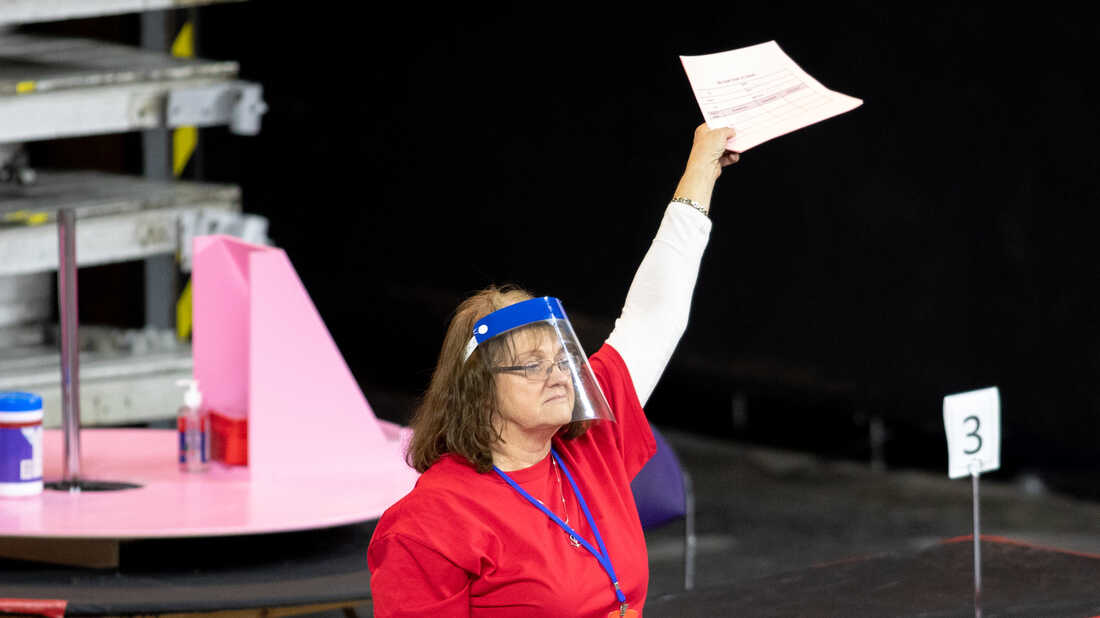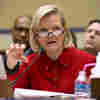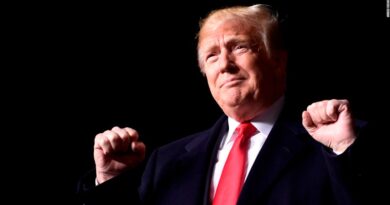Jane Mayer: ‘Dark Money’ Is Threatening The Elections Of 2020, 2024

A contractor works to recount ballots from the 2020 general election in Phoenix, Ariz., on May 1. The Maricopa County ballot recount comes after two election audits found no evidence of widespread fraud in Arizona. Courtney Pedroza/Getty Images hide caption
toggle caption
Courtney Pedroza/Getty Images

A contractor works to recount ballots from the 2020 general election in Phoenix, Ariz., on May 1. The Maricopa County ballot recount comes after two election audits found no evidence of widespread fraud in Arizona.
Courtney Pedroza/Getty Images
President Biden was sworn into office more than six months ago, but officials in Maricopa County, Ariz., are still searching for evidence that Biden’s victory in their state was based on massive voter fraud — even after multiple audits found no issues.
New Yorker writer Jane Mayer says the Arizona audit is an unprecedented undertaking, with potentially explosive consequences for American democracy.
Mayer notes that although the audit appears to be the work of local extremists, it’s actually being funded by sophisticated national organizations, whose boards of directors include some of the country’s wealthiest and highest-profile conservatives.
“The 2020 election is long since over in most people’s minds, and settled and decided,” Mayer says. “But these groups are doubling down in the money they’re putting into and the effort they’re putting into trying to push the idea of fraud — potentially in order to challenge the 2022 midterms, and the 2024 election.”
Mayer writes about what she calls the “dark money” behind the challenges to Biden’s victory in her latest article, “The Big Money Behind the Big Lie.” She says a well-funded national movement has been exploiting Trump’s false claims of widespread fraud in order to promote alterations in the way that ballots are cast and counted in 49 states. And, she adds, 18 states have already passed new voting laws in the past six months, according to the Brennan Center for Justice.
Mayer notes that while some of the challenges are coming from extremist groups, established conservative organizations — including the Heritage Foundation and ALEC — are also getting involved.
“Organizations that we have come to think of as pillars of the conservative movement … [are] throwing their efforts behind a very anti-democratic movement here that is scaring even some Republican election officials, and is also scaring election law experts,” she says. “They are really going all-in on this Trump lie.”
Interview Highlights
On the 2020 election audit in Maricopa County, Ariz., which is still ongoing
I think that some of the people who are carrying out this audit, you have to understand, are hardcore conspiracy theorists. And they’re setting out to prove that Trump really won. And Maricopa County is not just like any old little county in America. It’s the largest county in Arizona, and it’s the majority of votes for Arizona — it’s 2.1 million votes. So if they could move 10,000 votes and say 10,000 were fraudulent, they may be able to say that Trump did win. I think more likely … they’re laying the groundwork to challenge American elections in the future, and the one there in 2020. They’re spreading distrust.
On the push to allow state legislatures to select electors
Since the 19th century, the states have allowed the popular vote to determine which electors were elected, and then cast their ballots and pick the president. It’s an indirect form of direct democracy. What’s being talked about now and experimented with in Arizona is the idea that the state legislatures themselves would pick the electors. …
Now, this is a radical doctrine, but it’s being promoted by lawyers on the right, and nonprofit groups that are heavily funded on the right. And it is being truly experimented with in Arizona, where there was a piece of legislation that was a bill proposed to do exactly that — to allow the state legislature in Arizona to overturn a presidential election and decide itself where the electors should cast their ballots and for whom.
On the state of voting rights legislation
In 18 states now, legislation has been passed that cracks down on voting rights in various ways. So there’s certainly been an effort to limit things like mail-in voting and same-day voting and make registration more difficult. There were bills introduced in 49 states. So I think you’ll see another wave of that kind of legislation. And you may also see more of this argument being made, that is this kind of radical independent legislature doctrine argument that’s being made by legal organizations on the right, that argues that the legislatures have the right to intercede and even overrule the popular vote if there’s been something wrong with the election, if they can argue that there’s been fraud.
On discovering the source of the audit in Arizona
I went out to Arizona to take a look at this audit, and what I discovered was it’s not taking place in a vacuum. And it’s actually not just an Arizona thing. It’s being funded by out-of-state interests, deep-pocketed people who are allies of Donald Trump — that’s specifically the audit — and it’s taking place against a backdrop of this spreading belief that voter fraud is rife in America and that elections can’t be trusted. And that is being spread by national groups, some of them quite well-known and established in Republican circles. And so I kept sort of peeling back the onion to try to figure out, Where is this coming from? And the picture began to clarify that actually there’s a money stream and an awful lot of it is coming from one single huge foundation in Milwaukee, Wis., which is funding all of these other groups that are pushing the idea that voter fraud is a serious problem in America, and that we can’t trust our elections. And that one huge foundation is the Lynde and Harry Bradley Foundation in Milwaukee, Wis.
The Bradley family — these two brothers that founded this company, the Alan Bradley Company — they defined the far-right fringe. They were dedicated anti-communist zealots who feared that the United States government was run by communists. And they were fringe figures politically, but they were extraordinarily rich by the time they died. And their fortune has funded this far-right foundation.
On Cleta Mitchell, who is on the board of the Lynde and Harry Bradley Foundation
People may not know Cleta Mitchell’s name, or they may not have known it until news stories broke right at the beginning of this year that there was a lawyer on the call with Trump — it was a conference call to Georgia election officials. And Trump was basically berating them, saying, I just need to have 11,780 more votes because that will make me win in Georgia. Just find the votes. And it sounded as if they were just trying to overturn the election in Georgia.
And on that call was a lawyer named Cleta Mitchell. And it turns out Cleta Mitchell is fundamental to this movement to argue that voter fraud is rampant in America, and that Georgia’s election was a fraud, and that Trump really won it. And she’s been deeply involved in these issues, at least as far back as 2012. And she is on the board of the Bradley Foundation, where they have $850 million in their treasury to spend on all kinds of issues, including this.
On Public Interest Legal Foundation, also founded by the Bradley Foundation. Cleta Mitchell is its chair.
That group is based in Indiana and it litigates all over the country, accusing people and election officials of voter fraud. If you take a close look at it, what you can see is there’s just a short leap from accusing people of voter fraud to then arguing that an election should be nullified. And this is where it gets really radical. Among the directors of the Public Interest Legal Foundation is, for instance, a lawyer named John Eastman who was one of the speakers at Trump’s rally on Jan. 6. And at that rally, he argued that people needed to challenge the election returns and stop the certification of the vote on Jan. 6. As we all know, that just preceded by a couple hours, the crowd charging the capital, ransacking it and trying to stop the certification. So you can see the connections between a huge foundation on the right, the Bradley Foundation, which funds the Public Interest Legal Foundation, whose director spoke at the Jan. 6 rally, and tried to overturn that election, or at least stop it, halt it at that moment. And the money flows from one to the other, and the same characters are involved.
Sam Briger and Thea Chaloner produced and edited the audio of this interview. Bridget Bentz, Seth Kelley and Dana Farrington adapted it for the web.







